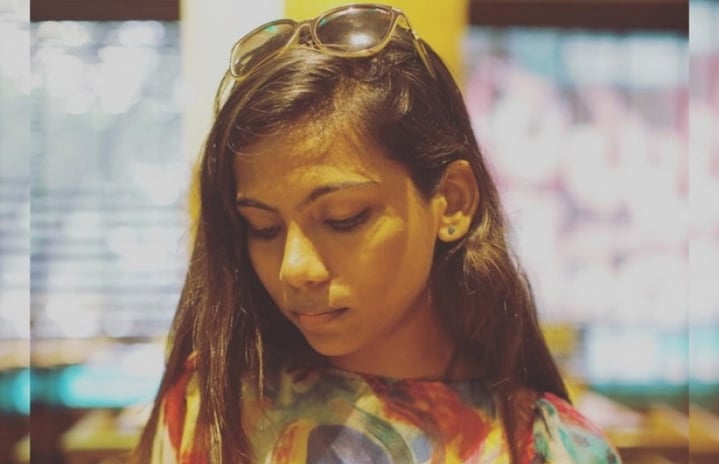The family of Raudha Athif, the Maldivian model who was found dead in her hostel in Bangladesh, has decided to take the case of her death to court, declaring that there were too many discrepancies at the scene of the death and in the police investigation to accept that it was a “suicide” as stated in her autopsy.
According to Bangladeshi media, her autopsy report confirmed that her death was suicide by hanging. However, her family continues to reject the report, saying that there are far too many inconsistencies and suspicions surrounding her death which imply that she was murdered.
Her family has spoken out about the case and Raudha’s father Dr Mohamed Athif related several circumstances and signs the family noticed which led to their suspicions.

He described how the family found her hostel room after her death, noting that the curry Raudha had cooked earlier was still on the stove, leftover ingredients on the cutting board and the bottle of curry spice under her bed. He also claimed that the mirror on her wardrobe was damaged and nearly hanging off, while her broom was found broken into pieces. Declaring that his daughter was always an organised and tidy person, Dr Athif said that the state of her hostel room had raised suspicions of a violent incident from the beginning.
Dr Athif also referred to claims made by Raudha’s college, Islami Bank Medical College & Hospital, and other students that they had had to break down her door’s lock to enter her room, where she was found “hanging” from the ceiling with a scarf. However, her father claims that her family found no signs of forced entry.
Athif, who is a physician with a background in forensic medicine, went on to say that there were bruises from strangulation around her throat and marks from fingers on her face. Noting that the ligature mark on her skin did not match that of the scarf from which she was said to have been hanged, Dr Athif also stated that there had not been any dribbling of saliva around her mouth which is atypical due to a hanging.

Raudha’s family also raised questions as to why Police had cleared away the scene of the death so soon. Pointing out that the police and college top officials had already ruled her death as suicide even before her autopsy report was released, her father demanded why no one including the police has a photograph of Raudha “hanging” as witnesses claim. He questioned why out of the twenty or so students who entered her room upon the discovery of her death, none had taken any photographs of her despite a number of them being forensic medicine students. Such students, he pointed out, would know the import of photographs and the necessary procedures for forensic investigations.
Suspicions raised by Raudha’s family over her death
Indications of strangulation on Raudha’s throat and face, but no signs of death by hanging on her body.
No sign of forced entry despite students’ claims that they had to break her room’s lock to enter.
Signs indicating violence took place in the room.
Conduction of autopsy without prior permission from Raudha’s family; Police had already concluded her death was a “suicide” before autopsy report and neglected the investigation, her family claims.
No CCTV footage of the night of Raudha’s death. Footage covers a scene of Raudha going out but none of her return. Footage of all other nights are accounted for.
“Lies” from Raudha’s college. Discrepancies on the last sighting of Raudha by the college’s students and security. Raudha was said to have gone to the doctor the night of her death but her prescription was denied to her family. Permission was first denied for her family to speak with the college’s doctor and various other staff.
Raudha’s clash with a Kashmiri girl
Raudha’s family are accusing one of her classmates, a Kashmiri girl named Seerat Parveen, of being connected to her death. She was the first person on the scene of Raudha’s death and she had raised the alarm to other students.
The family revealed some of the reasons behind their suspicions towards Seerat Parveen. According to Dr Athif, Raudha had shared with her mother, Aminath Muharrimath, certain troubling things that had occurred between herself and Seerat.

One occurrence Dr Athif highlighted was that Seerat had allegedly put sleeping pills in Raudha’s glass of juice one night while the two were studying together. Raudha had seen the pills and later informed her mother of what happened.
“Raudha and Seerat both fought on the phone over that incident. Raudha said that she didn’t even want to see Seerat’s face after that; that she can’t trust her. She even told [Seerat] not to come to her room anymore,” narrated Athif.
He also reported that some students have said that it was Seerat who accompanied Raudha to the hospital on the night of her death.
Bangladeshi police have confiscated Seerat Parveen’s phone in the wake of the accusations raised by Raudha’s family. However, Seerat has denied the allegations in an interview to the Daily Star news, insisting that shee never put sleeping pills in Raudha’s drink and that she does not believe Raudha would tell such a story.
Plans to move to Australia
Dr Athif described his daughter as a very happy and social person from her time studying in Indian city Bhopal to her death. Reiterating that Raudha had not suffered health or emotional issues that would lead to suicide, Dr Athif said that she had been talking with her aunt in Australia about her future dreams just days before her death.
“She messaged her aunt saying that she’s studying hard; that she’ll get good results and move to Australia next year.”

He said that Raudha had put a lot of effort into her studies with that motivation, earning the highest marks in some subjects. She had studied in India until grade six, after which she shifted to the Maldives’ capital of Male where she finished her O’ Level examinations and earned a spot in the National Top Ten Results. She had then completed her A’ Level examinations and worked as a clinical assistant in the military hospital of Senahiya and state Indira Gandhi Memorial Hospital (IGMH).
While she models as a hobby, her father said that Raudha was an open-minded and strong-willed girl. He also noted that things had been smooth sailing between Raudha and her boyfriend, who is studying in London.
Bullying instances in college
There are talks that many students who attend Islami Bank Medical College & Hospital are supporters of religiously conservative political organisations, which have been backed by Bangladeshi media reports.
According to Dr Athif, Raudha had followed her college’s dress code, including a shawl to cover her hair, and the administration had never raised complaints about her clothing. However, she had told her mother that many students had initially teased and bullied her for wearing jeans to classes. Her family said that Seerat Parveen had been among them.

“Her classmates used to tell her that wearing jeans is forbidden in religion. Though she didn’t wear hijab normally, she followed the college’s dress code.”
Dr Athif narrated that Raudha had brushed off the bullying because she was a capable girl with independent thinking that could handle herself. He admitted that Raudha had not raised the issue later on.
Noting that her international fame and achievements in studies may have incited envy among her peers, Raudha’s family concedes that they do not know the true motive behind Raudha’s “well-planned murder”, which they claim was staged to look like a suicide. However, Dr Athif declared that the family currently has evidence, which indicates that her death was a murder, which they are withholding from the media as the investigation is still ongoing.
Raudha’s family to court for justice
Maintaining that the police involved in her case had grossly neglected the investigation, Raudha’s family stated that they have also been informed as such by a number of lawyers in Bangladesh as well. Hence, her father declared that the family is in talks with a criminal lawyer to take the case to court.
Raising questions about why Raudha had gotten ready for the day as per normal if she was planning to commit suicide, along with the abrasion marks found on her neck and other suspicious signs in her hostel room which points to an attack, her family has declared that Raudha’s death was “postmortem hanging which was staged to show the death to be a suicide”.
Calling on the Maldives’ government to request a top level independent investigation into Raudha’s death, Dr Athif said, “I appeal to her college authorities, investigation agencies and international right activists and investigative journalists to put all their collective efforts to bring out those behind her death to justice.”
